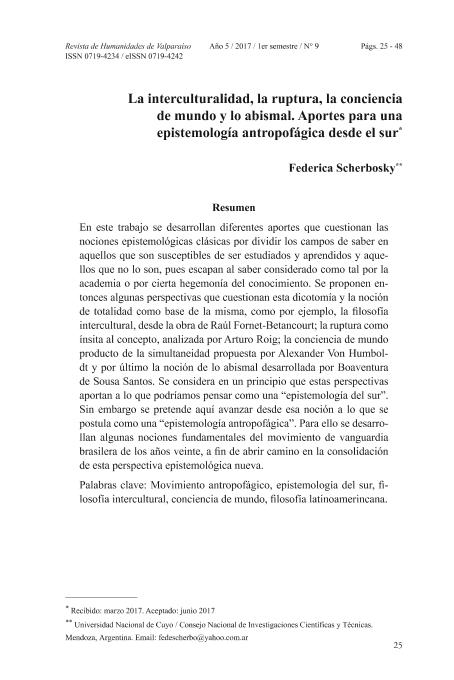Mostrar el registro sencillo del ítem
dc.contributor.author
Scherbosky, María Federica

dc.date.available
2022-12-28T18:22:11Z
dc.date.issued
2017-07
dc.identifier.citation
Scherbosky, María Federica; La interculturalidad, la ruptura, la conciencia de mundo y lo abismal: aportes para una Epistemología Antropofágica desde el sur; Universidad de Valparaíso; Revista de Humanidades de Valparaíso; 9; 9; 7-2017; 25-48
dc.identifier.issn
0719-4234
dc.identifier.uri
http://hdl.handle.net/11336/182753
dc.description.abstract
En este trabajo se desarrollan diferentes aportes que cuestionan las nociones epistemológicas clásicas por dividir los campos de saber en aquellos que son susceptibles de ser estudiados y aprendidos y aquellos que no lo son, pues escapan al saber considerado como tal por la academia o por cierta hegemonía del conocimiento. Se proponen entonces algunas perspectivas que cuestionan esta dicotomía y la noción de totalidad como base de la misma, como por ejemplo, la filosofía intercultural, desde la obra de Raúl Fornet-Betancourt; la ruptura como ínsita al concepto, analizada por Arturo Roig; la conciencia de mundo producto de la simultaneidad propuesta por Alexander Von Humboldt y por último la noción de lo abismal desarrollada por Boaventura de Sousa Santos. Se considera en un principio que estas perspectivas aportan a lo que podríamos pensar como una “epistemología del sur”. Sin embargo se pretende aquí avanzar desde esa noción a lo que se postula como una “epistemología antropofágica”. Para ello se desarrollan algunas nociones fundamentales del movimiento de vanguardia brasilera de los años veinte, a fin de abrir camino en la consolidación de esta perspectiva epistemológica nueva.
dc.description.abstract
This work develops different contributions that challenge the epistemological classic notions to dividing fields of knowing in those who are susceptible of being studied and learnt and those who are not, beyond the knowledge considered as such by the Academy or by certain hegemony of knowledge. We propose some perspectives that question this dichotomy and the notion of totality as its basis, as for example, intercultural philosophy, from Raúl Fornet-Betancourt; the rupture like a function of the concept itself, analyzed by Arturo Roig; the consciousness of world product of the simultaneity proposed by Alexander Von Humboldt and finally the notion of the abysmal developed by Boaventura de Sousa Santos. These perspectives contribute to think an “epistemology of the South”. However, we expect here to advance from that notion to other, that is postulated as an ‘anthropophagic epistemology”. So some basic knowledge of the Brazilian avant-garde movement of the 1920s are developed in order to pave the way in the consolidation of this new epistemological perspective.
dc.format
application/pdf
dc.language.iso
spa
dc.publisher
Universidad de Valparaíso
dc.rights
info:eu-repo/semantics/openAccess
dc.rights.uri
https://creativecommons.org/licenses/by-nc-nd/2.5/ar/
dc.subject
MOVIMIENTO ANTROPOFÁGICO
dc.subject
EPISTEMOLOGIA DEL SUR
dc.subject
FILOSOFÍA INTERCULTURAL
dc.subject
FILOSOFÍA LATINOAMERICANA
dc.subject.classification
Otras Filosofía, Étnica y Religión

dc.subject.classification
Filosofía, Ética y Religión

dc.subject.classification
HUMANIDADES

dc.title
La interculturalidad, la ruptura, la conciencia de mundo y lo abismal: aportes para una Epistemología Antropofágica desde el sur
dc.title
Inttercultural philosophy, rupture, consciousness of world and the abysmal: contribution to an Anthropophagic Epistemology from the South
dc.type
info:eu-repo/semantics/article
dc.type
info:ar-repo/semantics/artículo
dc.type
info:eu-repo/semantics/publishedVersion
dc.date.updated
2022-12-27T18:10:59Z
dc.identifier.eissn
0719-4242
dc.journal.volume
9
dc.journal.number
9
dc.journal.pagination
25-48
dc.journal.pais
Chile

dc.journal.ciudad
Valparaíso
dc.description.fil
Fil: Scherbosky, María Federica. Consejo Nacional de Investigaciones Científicas y Técnicas. Centro Científico Tecnológico Conicet - Mendoza. Instituto de Ciencias Humanas, Sociales y Ambientales; Argentina
dc.journal.title
Revista de Humanidades de Valparaíso
dc.relation.alternativeid
info:eu-repo/semantics/altIdentifier/url/https://revistas.uv.cl/index.php/RHV/article/view/60
dc.relation.alternativeid
info:eu-repo/semantics/altIdentifier/doi/https://doi.org/10.22370/rhv2017iss9pp25-48
Archivos asociados
